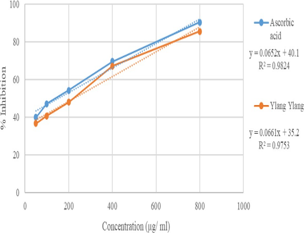Abstract
Essential oils are secondary metabolites contains a complex mixture of terpenes with a diverse array of chemical structures, play a crucial role in the management of complex diseases like cancer via synergistic and antagonism effect. Ylang Ylang essential oil (YYEO) extracted from the flowers of Cananga odorata is renowned for its fragrance, contained more than 150 essential components within it, and utilized in various diseases and cosmetics. Traditionally YYEO is being used as an aphrodisiac, anxiolytics, antihypertensive, antiseptic, in food and beverages as a fragrance agent. Due to the presence of a complex mixture of essential components in YYEO, we aimed the current study to assess the anticancer potential against Ehrlich Ascites Carcinoma (EAC) bearing mice. In vitro antioxidant, tumour growth, body weight, biochemical, haematological, and serum estimation was evaluated with subsequent histopathology of the liver. 5- Fluorouracil (5- FU) was used as a standard drug. YYEO showed potent antioxidant activity by DPPH assay. YYEO significantly reversed the Hb, lymphocytes, WBC, and RBC numbers in the treated group compared with the disease control group. YYEO administration has restored the imbalanced levels of antioxidant biomarkers such as MDA, GSH, and SOD activity. YYEO reversed the histopathology of the liver altered by the EAC in mice. In conclusion, a complex mixture of terpenes contained in YYEO could be the potent anticancer therapy in the future. Further studies are needed to identify the active principles and the mechanism involved in this anti-tumour activity.
Full text article
Authors

This work is licensed under a Creative Commons Attribution-NonCommercial-NoDerivatives 4.0 International License.

